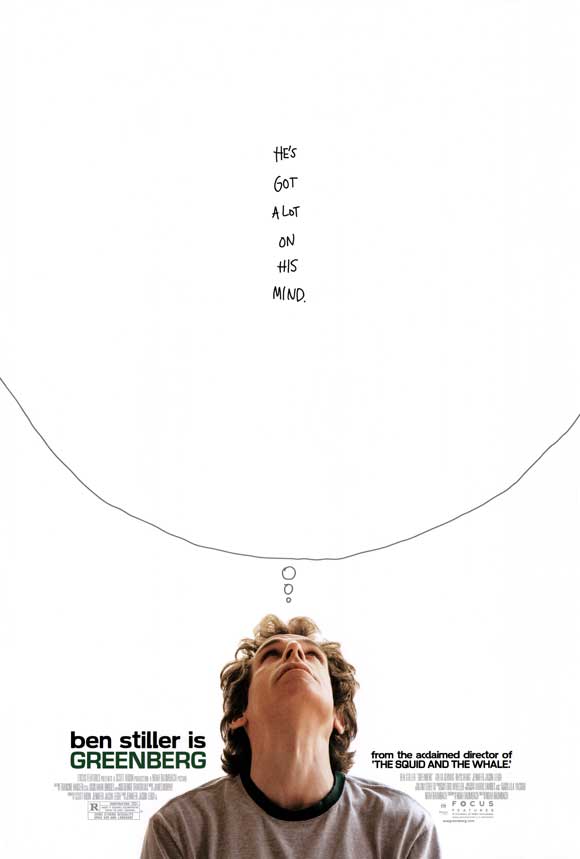
GREENBERG (2010. directed by Noah Baumbach, 107 minutes, U.S.)
BY DAN BUSKIRK FILM CRITIC
Greenberg is a very funny new character study about an improbable man. Ben Stiller is ingeniously cast to bring to life Roger Greenberg, a man who seems to have found every experience in life so disappointing that his world has come to a halt. He washes up rootless in his old hometown of L.A. after living in New York City for years. While house-sitting for his brother’s family he reconnects with all the old friends he has alienated and starts a very unromantic romance with his brother’s young assistant Florence. Florence (played by Mumblecore Diva Greta Gerwig) is a sweet and insecure cafe folk singer when she’s not working for Roger’s brother. She’s just out of college, is falling in and out of bed a little and feeling a bit rootless herself.
Roger is recovering from some sort of unspecified breakdown so he’s “trying to do nothing for awhile” and Greenberg the movie follows his lead, aimlessly bumming around with this malcontent as he offers witty and sour insights on modern life and modern L.A. “All the adults here dress like kids here and all the kids dress like superheroes” is a typical comment and they keep coming as long as he has someone to whom he can kvetch. When he doesn’t he writes snide screeds to businesses whose service he finds lacking.
Written by director Noah Baumbach with his wife Jennifer Jason Leigh (who makes a brief appearance as Roger’s ex-girlfriend), Greenberg is a rambling, well-observed character study that recalls the sort of social satires Hal (Shampoo) Ashby made in the 1970’s, where unlikely characters struggle to live up to society’s expectations. Greenberg may have lame excuses for his many shortcomings (he can’t swim, he can’t drive and he backed out of a record deal against the wishes of his still-disgusted old bandmates) but the world he rails against certainly seems worthy of his disdain.
Yet as entertaining as the film is, I feel like Baumbach is stacking the cards to get us to embrace someone we should rightfully be repulsed by. Roger’s sense  of entitlement, superiority and cynicism could only be this perversely enjoyable when wrapped in the movie star charisma of Ben Stiller. Stiller hasn’t shown his face in anything but mainstream comedy fodder since 2001’s Royal Tenenbaums and his performance here is a welcome reminder of how engaging he can be. Stiller specializes in a certain slow burn agitation yet here the tension is somewhat submerged, his eyes glazed over from his regiment of prescription meds. Much as Nicholas Cage did earlier this year in Herzog’s Bad Lieutenant remake, Stiller shows us why he’s a box-office success, even with his everyman looks he is compulsively watchable.
of entitlement, superiority and cynicism could only be this perversely enjoyable when wrapped in the movie star charisma of Ben Stiller. Stiller hasn’t shown his face in anything but mainstream comedy fodder since 2001’s Royal Tenenbaums and his performance here is a welcome reminder of how engaging he can be. Stiller specializes in a certain slow burn agitation yet here the tension is somewhat submerged, his eyes glazed over from his regiment of prescription meds. Much as Nicholas Cage did earlier this year in Herzog’s Bad Lieutenant remake, Stiller shows us why he’s a box-office success, even with his everyman looks he is compulsively watchable.
Stiller’s way with a deadpan one-liner and cinematographer Harris Savides gorgeous work, reinforcing the idea of an isolated and unfriendly L.A., makes it surprisingly easy to live with this grump. And Greta Gerwig’s naturalistic Annie Hall-like insecure love interest is so welcome on screen you can almost forgive Greenberg for being another film where the middle-aged lead easy scores a girlfriend a decade-and-a-half younger than himself. A bitter brand of cynicism being sold in this film and one that would play out much less rewardingly in real life. The real life Greenbergs are the death of any party.
RELATED: Greenberg is pretty much the fictional representation of the masculinity crisis that Susan Faludi outlined in her 1999 book Stiffed: The Betrayal of the American Man. Men like Greenberg, Faludi argued, were led to believe as boys that they were “going to be the master of the universe and all that was in it,” that they’d be astronauts conquering the final space frontier or, at the very least, that they would master a lifelong stable job and a healthy family. But by the ’90s, Greenberg types found themselves “masters of nothing.” The latest recession is only making it more so, as job security becomes a fantasy for many, and marriage rates plummet. And yet men are still tragically unable to retool. The image of the American woman has gone through several upheavals since the 1950s, but the masculine ideal seems fixed in cultural aspic: Think slick ad executive Don Draper in Mad Men and the WWII heroes in the Tom Hanks-produced HBO series The Pacific. So his confused, paralyzed counterpart is cropping up in ever-more variations on TV and in movies: the omega male. MORE
